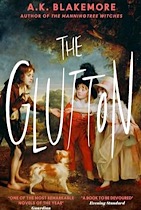“The memoirs of a cannibal, she thinks. But who would wish to read such a thing?”
 Readers of AK Blakemore’s debut novel, The Manningtree Witches, will likely need little encouragement to dabble with her second book, The Glutton. Blakemore has an interesting and distinctive voice, the case has already been made and won – The Glutton is further evidence of that, albeit tempered perhaps a jot.
Readers of AK Blakemore’s debut novel, The Manningtree Witches, will likely need little encouragement to dabble with her second book, The Glutton. Blakemore has an interesting and distinctive voice, the case has already been made and won – The Glutton is further evidence of that, albeit tempered perhaps a jot.
“Mesdames and Messieurs, I give you The Great Tarare – The Glutton – The Bottomless Man!”
We are in 18th century France, in the company of a man known as Tarare. He is dying, attended by a nun who is aware of the legendary figure he once cut as a man who would eat anything (a semi-historical Monsieur Mange-tout if you will). Tarare started out as the poor son of a poor mother, raised amidst whoring and thievery (there was a particularly lively salt trade at the time the story takes place, apparently) – and things don’t get a whole lot better for him really.
Beaten and left for dead, he falls in with a small group of itinerant peddlers and meddlers and tricksters and criminals who find, in Tarare, someone whom they can leverage for riches – in that Tarare will eat anything, from a belt to a dead rat, from a gutter full of offal to – well, some of the things he eats are best left for the reader to discover (just know that The Glutton, like The Manningtree Witches before it, is not afraid to go to some pretty dark places). But the great reveal at the heart of the book is that Blakemore makes you care for this monster, a boy, really, beset by an awful hunger:
“I am always hungry, monsieur. (This answer, though true, seems insufficient. He wants to say: hunger is all I am and all my life is. Hunger runs through my veins like blood, branches through me like fungus, swelling and renewing itself daily…”
As with The Manningtree Witches, the language on display here is rich, as rich and as exotic as the most tantalising chocolate cake, and like the most tantalising chocolate cake, there are times when we would go as far to say, it can be a bit much. We know Blakemore started out as a poet, and she has a poet’s eye for detail but also a poet’s eye for a distracting word so you may find yourself, as we did, stopping to go and look up a word that you’ve never seen before (which is no bad thing but taken in abundance can make you feel a bit stupid).
At the same time, however, the twists and turns Blakemore leads you along are in themselves examples of a bright and inquisitive mind – and so whether you are disappearing within Tarare himself (as his bedside nun Sister Perpetue finds herself at one point) or exploring additional surprises (Pulp Fiction-like) after Tarare himself has ostensibly split the scene, you can’t help but find yourself thinking, this AK Blakemore has tricks a-plenty up their sleeve.
So yes, possibly some of the excesses should be reined in (a little) for book three (whatever shape that takes – we’ve had witches and now we’ve had cannibals – what can possibly come next?) but it’s worth saying, Blakemore is a writer like Benjamin Labatut, by which we mean to say, one of a hot new breed and we are froth-mouthed in anticipation of whatever comes next.
Any Cop?: Perhaps a smidge not as good as The Manningtree Witches, The Glutton is still head and shoulders above the stinking heap of much else published this year.